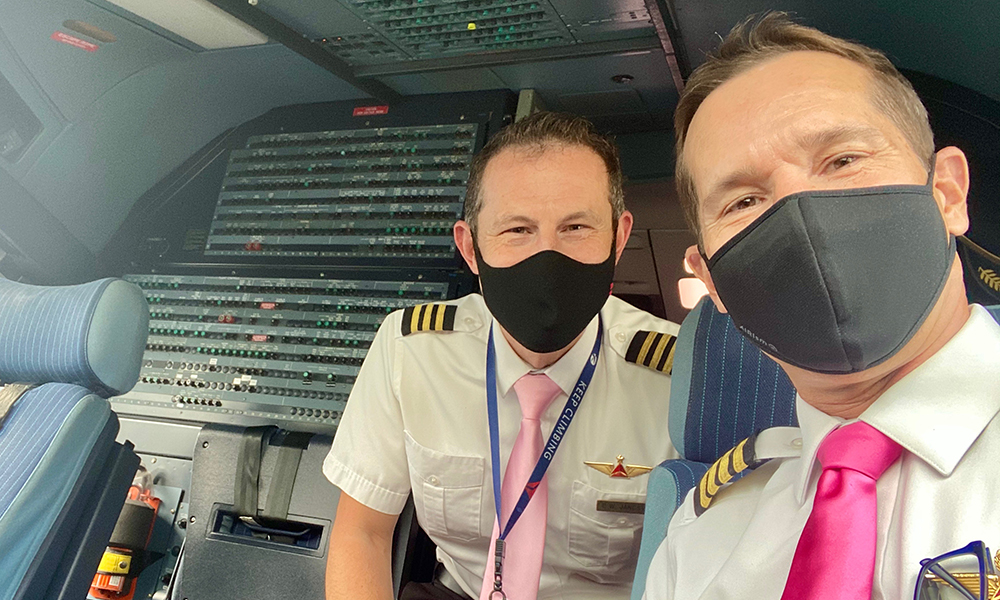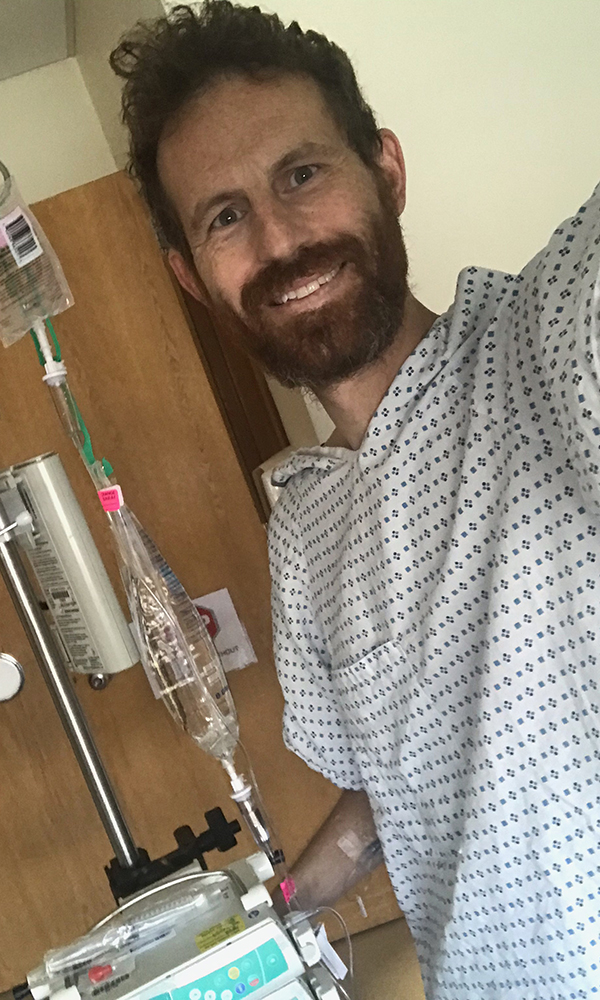The last time I spoke to Saratoga Springs native Paul “Tucker” Jancsy—a major in the New York Air National Guard and Delta Air Lines pilot—he and his wife, Sara, had just been through 35 days of unmitigated hell. Five weeks beforehand, Jancsy, who had just finished a shift for Delta at its New York City travel hub, had traveled home to Saratoga for some much-needed time off. Over the next few days, Jancsy came down with a high fever, which he couldn’t shake, and by March 26, he was being rushed to Saratoga Hospital with advanced COVID-19 symptoms. In fact, he’d been so sick that doctors had had to intubate him, isolate him and put him on a ventilator, a measure that, at the time, had basically been the equivalent to a death sentence.
Miraculously, doctors would end up removing Jancsy’s ventilator (or “vent” as he calls it) and he would walk out of Saratoga Hospital under his own power on April 23.
When Jancsy picked up my FaceTime call two days after his release, he was still a gaunt, pale, bearded shell of the guy I remembered from high school—but he was happy to be alive. During the course of our conversation, he apologized repeatedly, dissolving into explosive, percussive coughing fits. At least to me, it was obvious that COVID-19, which many people had brushed off as a harmless flu-like sickness, was anything but. This once healthy, strong 40-year-old guy, who could’ve easily been me or anyone else we graduated with from Saratoga Springs High School, had barely escaped with his life. And unbeknownst to me or him or his wife at the time, he was far from out of the weeds.

Shockingly, just two days after he hung up the phone, Jancsy was back in the COVID ward, in isolation, at Saratoga Hospital for an additional week, suffering from life-threatening blood-clotting issues. At the time, it was still too early for doctors to grasp just what the virus did to the bodies of those who had “recovered,” so Jancsy had been released from the hospital without really knowing what kind of side effects to expect down the line. (He did have regular medical care and physical therapy sessions.) On the morning of April 28, Jancsy says he got a call from his primary care physician, asking where he was. “I’m in bed,” Jancsy remembers saying, thinking it was a strange question. “What’s going on?” His doctor told him that he’d be receiving a call from his pulmonologist, and that he needed to take it. Jancsy hung up, thinking it odd that his doctor had called him directly—something his doctor’s receptionist usually did. “As if on cue, the phone buzzed again, and I answered it,” says Jancsy. It was his pulmonologist. “This is not an emergency,” he said, “but you have to come to the Emergency Room.” Once again, a pause. This time, Jancsy wasn’t playing anymore guessing games: He wanted to know what was going on. The pulmonologist calmly instructed Jancsy to have his wife drive him to the ER. (Mind you, he had only recently re-learned how to walk and was still having trouble cutting up his own food and feeding it to himself, so he wasn’t ready to drive just yet.) Jancsy, it turned out, had developed what was known as a “pleural effusion,” or a build-up of fluid and blood in the lungs because of blood-clotting complications. Around that time, medical experts realized that COVID thickens patients’ blood to the point where they could potentially die from said issues. (Late Broadway actor Nick Cordero, who was just 41 when he died from COVID complications, suffered from a similar issue and had to have his leg amputated before succumbing to the virus.)
Needless to say, Sara was extremely upset when she learned that she’d have to drive her husband, whom she’d just been reunited with after 35 days, back to the hospital for another potentially life-threatening emergency. She had no other choice. “When I went back in, it was almost like a family reunion,” Jancsy jokes. It was the exact same care team that had helped nurse him back to life from before. At first, he says he felt a little embarrassed to be back, because he felt like he’d failed his caregivers. This time, he was a lot more lucid, too. But when they assured him that he was back to get better again, he felt a weight lifted.
Certainly, that week back in the hospital wasn’t an easy one—not even that first day. As if out of some low-budget horror movie script, doctors gave Jancsy a cocktail of painkillers, laid him down on a surgical table, made a sizable incision in his chest and inserted a tube in it, all while he was still awake. Jancsy remembers, right before being cut open, one of the pulmonologists, Dr. Hung Dinh Nguyen, MD, laughing and saying, “You can say anything to me; I’ve heard it all. You’ll see.” Up until that point, Jancsy says, he hadn’t really taken a full, deep breath since getting out of the hospital, but with the chest incision and his lungs able to expand to full capacity, it was suddenly possible. But what happened next is not for the faint of heart: As soon as Jancsy took his first deep breath, all of that fluid and blood that had filled up in his chest cavity began shooting out, hither and yon, like someone squeezing a turkey baster. (The attending doctor and nurses were all wearing protective gear and face shields, of course, but it was spattering all over them.) At this point, Jancsy was screaming expletives at the top of his exposed lungs, and it was all by design: the more carrying on, the more fluid would be released. “The nursing staff and the doc who was there helping me were basically like, ‘Oh, you’re doing a great job,'” says Jancsy. “I got to tell you, after that, I’d do anything.”

On November 13, more than six months after Jancsy and I had last spoken, he recounted that horrifying tale, along with a number of others, on a Zoom call from his and Sara’s new apartment in Alexandria, VA. (Jancsy recently accepted a 10-month military liaison position there, while he awaits medical clearance to begin flying for the Air National Guard again.) Jancsy, now clean shaven with color, flesh and life back in his face, looked pretty good, all things considered. After some good-natured banter, I asked whether he walked around now feeling “immune” to the COVID-19 virus. “You know, it’s crazy,” he says, “I have the T-cell, which is like the mack-daddy antibody. But it’s not about me—and it goes back to our first conversations and even before, when I was racked out on a vent and you were talking to Sara—it’s about us. I know how bad the virus is, and that’s why I want everyone to wear a mask.” Jancsy takes that a step further, saying that when he sees people not complying with simple mask-wearing or social-distancing orders, he feels a twinge of…something. “It’s not survivor’s guilt,” he explains, but rather a sort of hyper-empathy. “I had great health insurance and [got COVID] early, and Saratoga Hospital had a bed for me, and now I see parts of Texas and the Midwest and Wisconsin and North Dakota are running out of hospital beds,” he says. “What happens next week, when the next couple of folks show up?” That guttural je ne sais quoi reared its ugly head when he copiloted a flight down to Florida (he was cleared to begin flying for Delta about six weeks ago, after a rigorous regimen of flight simulations and additional testing). “I went down to Fort Myers and went into a chain restaurant,” says Jancsy, who was accompanied by the flight’s captain. “I sat down and took my mask off, and the guy sitting next to us said, ‘You don’t have to wear that thing on the way in. I don’t believe in it anyway.’ The captain and I are looking at each other, shaking our heads. It’s not worth having a political fight when we’re trying to have dinner. Maybe the guy was drunk? I don’t really know, I don’t really care. That’s the most ignorant thing I’ve heard, and I’ve heard a lot of stupid shit.”
To that last point, one of Jancsy’s toughest realizations after being released from the hospital the first time was the fact that he had infected Sara with COVID, though she was never hospitalized, and his father, Paul Sr., who was a different story altogether. Though the staff at Saratoga Hospital didn’t tell the critically ill Jancsy at the time, his dad had wound up in the same COVID unit, two doors down from him. “Two Paul Jancsys,” says Paul and Sara, almost simultaneously. (Sara joined our Zoom call about a half hour in.) Jancsy’s mind then shifts to his lowest point at the hospital, right before his doctors put him on the vent. He recalls being woken up, in a medically induced haze, and a nurse handing him a phone in order to make what could’ve been his three last phone calls ever. “I called my dad first, and I didn’t know that he was already sick; they didn’t tell me that,” he says. “It went right to voicemail, and I left him a message.” (Jokingly, Jancsy says he thinks his dad will someday use the message, which was rife with mea culpas and apologies, against him.) He then called his mom, who was in absolute hysterics. “And then I called Sara,” he says, “and at this point, they were wheeling me through the hospital to take me to the ICU, which is upstairs from the COVID unit. That was just like the movies where you see the lights going by on the ceiling, and you hear all the medical talk around you.” His stretcher stopped in front of a nurse, who was holding a tube that would soon be gliding down his throat, and that’s when he made his final call, speaking what he believed to be his final words to his wife. “I consider myself lucky, because you want to be 140 years old, not 40 years old, when you say your last words,” he says. “I never really thought about it, and let me tell you something, it wasn’t prophetic at all. I’m totally not a writer.” Jancsy told her: “Don’t unplug me.”
This Thanksgiving, while you’re feasting on turkey, gravy, mashed potatoes and cranberry sauce—hopefully, in a household of 10 or less—be thankful that you’ll never have to say those words and mean them. Maybe.


